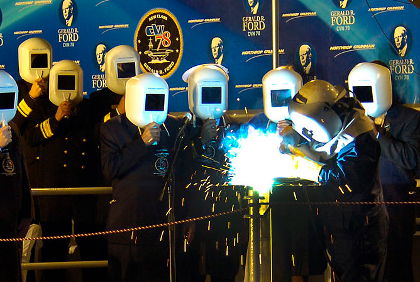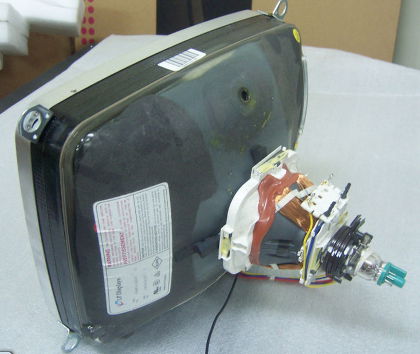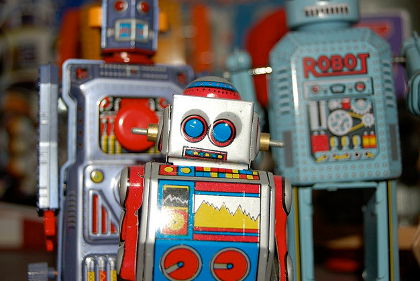Jonathan Dodd‘s latest column. Guest opinion articles do not necessarily reflect the views of the publication. Ed
There’s a lot of discussion out there at the moment about robots. One school of thought believes that we’re about to embark on a change as fundamental as the Industrial Revolution. Another group thinks we’re already in the middle of it. The opinions expressed about robots vary from extreme fear to real excitement. But the one thing they all agree on is that it’s really happening.
I suppose there’s a case to be made for simply rejecting the whole idea of robots in favour of something simpler that requires less thought. I suspect there’s an element of this amongst our friends in the Islamic State, who would rather pull everything down for something they would call ‘Earthly paradise’ in order to attain the after-death Paradise they so fervently believe in. It’s not a very wise course though, because robots are real, and there’s not a shred of evidence that any particular afterlife isn’t just a made-up fairy tale.
The thrill of the struggle
These I.S. people don’t seem to be very good at describing what the world’s supposed to look like when they’ve won. I suspect they have no idea and don’t really care anyway. They probably just like the thrill of the struggle and the feeling of release from all the restrictions that social groupings demand of us. I think they would find it impossible to settle down into any version of normal life. And once they’ve destroyed all so-called ‘Western’ things they wouldn’t even get to play with all those weapons and vehicles they like using so much.

The whole trouble with change is that we don’t know what’s actually going to happen. That’s why we don’t like it. It’s uncomfortable. What we all want is a life where things don’t change. Of course, change happens all the time, and it’s very annoying. Most irritating though, is that there are some changes we really rather like, but we want them to happen in an organised and uncomplicated way. Above all, we don’t want our changes be at all scary or even mildly alarming.
Relentlessly managing all the elements of life
Just because this has never happened in the entire history of the human race doesn’t stop everyone still wanting it to be cosy, or maybe wanting it to happen to other people first so they can be sure it’s been field-tested. The truth is that there never has been a time when things didn’t change and everything was safe and secure. Anyone who believes that there was is conning themselves.

There’s no harm in wishing that things didn’t change, but immense harm can be caused by people trying to stop change, just as much as when change is pushed through without any scrutiny or attention to safety or consequences.
Sadly, there is only one good way to live, and that’s by working very hard and relentlessly managing all the elements of that life. Or, to put it another way, there’s no point in complaining about the water coming through the roof if you haven’t made sure that your roof is waterproof in the first place. And there’s no point in complaining about the random object that crashes through that same roof during an unexpected storm. These things just happen.
Customers would never go anywhere else
We live now in a global economy, from which there’s no escaping (apart from running off and joining I.S.), and we need to keep up with the pace of change, or we won’t be part of the future at all, and we’ll decline like any economy that doesn’t embrace progress. I remember with embarrassment the once-great British car industry, which ignored the changes in the global car manufacturing map and went on producing cars that cost more and worked less well than the competition, and believed to the very end that customers would never go anywhere else.

I remember with equal embarrassment the reaction to bad news, which wasn’t – ‘We’d better build better cars’. Instead they got Bruce Forsyth to sing a song exhorting people to ‘Buy British’. Nowadays we build far more cars in this country than we ever did when the badges were British, and they’re better quality too. And robots are involved.
Better off, better educated, and they lived longer
People go on about the dignity of the worker. But asking a person to weld all day long isn’t the best guarantee of quality, in work or in life. It’s well-known that productivity decreases on any Monday after the home team has lost, and individual workers are liable to illness and lapses of concentration and difficulties with lifestyle or relationships that they bring with them to work. Why not use robots for the boring or mundane work if you can?

This leaves the ex-worker without a job, of course, and there’s even less dignity in that. The jury’s out on whether more robots mean more or less work for people. What is clear, however, is that work and jobs change over time. Back in the eighteenth century most jobs were on the land. New machines changed all that. Mechanised agriculture was less labour-intensive, and the rural population became factory workers in the cities. This led at the same time to an explosion in the variety and range of jobs available.
Teachers, policemen, road sweepers, newsagents, waitresses, bus drivers, writers, advertising and travel agents, to name but a few. For two centuries, everything changed. All the time. And people became better off, better educated, and they lived longer.
Television and video repairs or computer programming
What’s happening now is more of the same, except it isn’t machines that are taking over some of the work. It’s robots. Or rather, machines with Artificial Intelligence.
There’s a difference. These robots don’t necessarily look like humans, with a head and arms and legs. You might find yourself being diagnosed by a robot that has taken the place of your doctor, or taught a language by a robot. You might not even realise it’s a robot, because it might look like a computer screen. It’ll be there because it does the job at least as well as the human that used to do it. Like your driverless car.

Back in 1980 I was out of work for a year. Back in those days the Government offered retraining courses, and they gave me a leaflet with a long list of skills I could learn. I studied the list and decided that I should apply for something that I thought would still be around ten or twenty years later. I eventually whittled the list down to two – television and video repairs or computer programming. The repairs course was farther away and lasted longer, so I opted for programming. For once in my life I made a good decision.
Just like it is today
I don’t know what jobs and career paths these new robots will take over, and I certainly don’t know what new jobs will be generated as a result. But I do know that the future will be different, and in ways I can’t begin to imagine. Some aspects of life, as always, will be fantastic, and some will feel terrible. Just like it is today.

Plus ça change, plus c’est la même chose. I learned that from a robot.
If you have been, thank you for reading this.
Image: artur coelho under CC BY 2.0
Image: EpicLOL under CC BY 2.0
Image: Henry Flower under CC BY 2.0
Image: Hochgeladen von DeFacto under CC BY 2.0
Image: United States Navy under CC BY 2.0
Image: jeffedoe under CC BY 2.0





